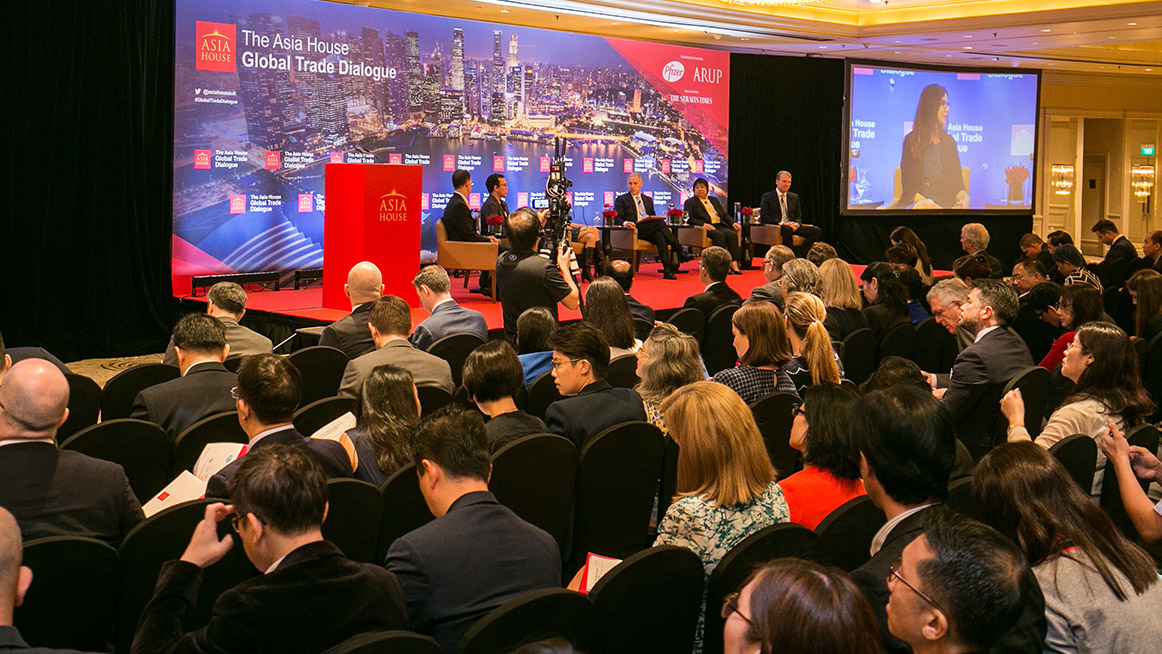Driving commercial and political engagement between Asia, the Middle East and Europe
Driving commercial and political engagement between Asia, the Middle East and Europe
Driving commercial and political engagement between Asia, the Middle East and Europe

Southeast Asia’s internet economy will be worth US$300 billion by 2025, according to a new Google and Temasek report. Alongside the commercial opportunities this will bring, the digital revolution could see companies “completely re-imagine” their business models and herald unprecedented social benefit, a panel of leading industry figures told The Asia House Global Trade Dialogue in Singapore.
Stephanie Davis, Managing Director of Sales and Operations for Southeast Asia, Google, said the growth rate of the region’s digital economy has hugely outstripped expectations.
“In 2015 we estimated that by 2025 the digital economy would be US$200 billion,” she said. “Then in 2018 we said US$240 billion, and this year we said US$300 billion.”
Rapid progress in five out of six key digital areas “has really spurned things along faster than we had imagined,” Davis added.
The speed of this transition will bring profound change, even to sectors that have traditionally been slow to embrace digitisation, according to Pierre Gaudreault, President, Asia Emerging Markets Region, Pfizer Biopharmaceuticals Group.
“It’s fascinating and perplexing to see how resistant healthcare was and still is to digital disruption,” Gaudreault said. But this will change as digital technologies redraw the process in which health products are developed and brought to market.
“AI technologies and machine learning will accelerate that life cycle tremendously, and will be of huge benefit for patients and society,” he said, adding a prediction that “new healthcare algorithms to predict better outcomes will grow exponentially in the next few years.”
However, the biggest disruption “will be around how we use data to provide better outcomes for patients,” Gaudreault said.
Data is, of course, at the heart of the digital economy. But its implementation goes beyond the commercial context between business and consumer. That same data can help SMEs access trade finance in ways previously unimaginable, as Fajrin Rasyid Co-Founder and President of the Indonesian unicorn Bukalapak, pointed out.
“We can only grow so long as the merchants inside our ecosystem can grow,” he said, “so we also look how we as a platform can help them grow.”
To stimulate that growth, Bukalapak is partnering with banks and FinTech companies to facilitate data-driven financing to help SMEs grow.
“If merchants need financing we will ask them if they want their data shared with our financing partners,” Rasyid said. “We use the data to decide the amount of financing we want to give.”
But data is, of course, an increasingly controversial and contested commodity, exposed to regulatory and political risk. For George Raymond Zage III, CEO of Tiga Investments and a member of Gojek’s Board of Commissioners, this presents a challenge to investors.
“If you’re obsessed with trying to protect data, it is fundamentally unrealistic,” he said, highlighting the role of mobile usage in companies gaining a wealth of information on consumers.
“In terms of creating value, I think it’s easier if people just assume that it’s out there and to not be that bothered by it. If you’re in a country that’s trying to hammer that [data] down, that would make me nervous.”
Despite the challenges, digitisation offers exciting opportunities to reshape the commercial environment, as Lay Lim Teo, Senior Managing Director of Accenture ASEAN, colourfully conveyed with a case study.
Teo cited a comedy club in Spain which is using digital technologies to explore new business models.
“They have installed screens in front of every seat, and they now charge by the laugh. Sensors tell if you’re laughing or not,” she said. “They’ve seen a 35 per cent increase in audience sizes and a seven-euro-per-head lift in revenues.”
For Teo, this example encompasses the potential of the digital economy to find new value in established services.
“Digital allows us to completely re-imagine what we do,” she said.
